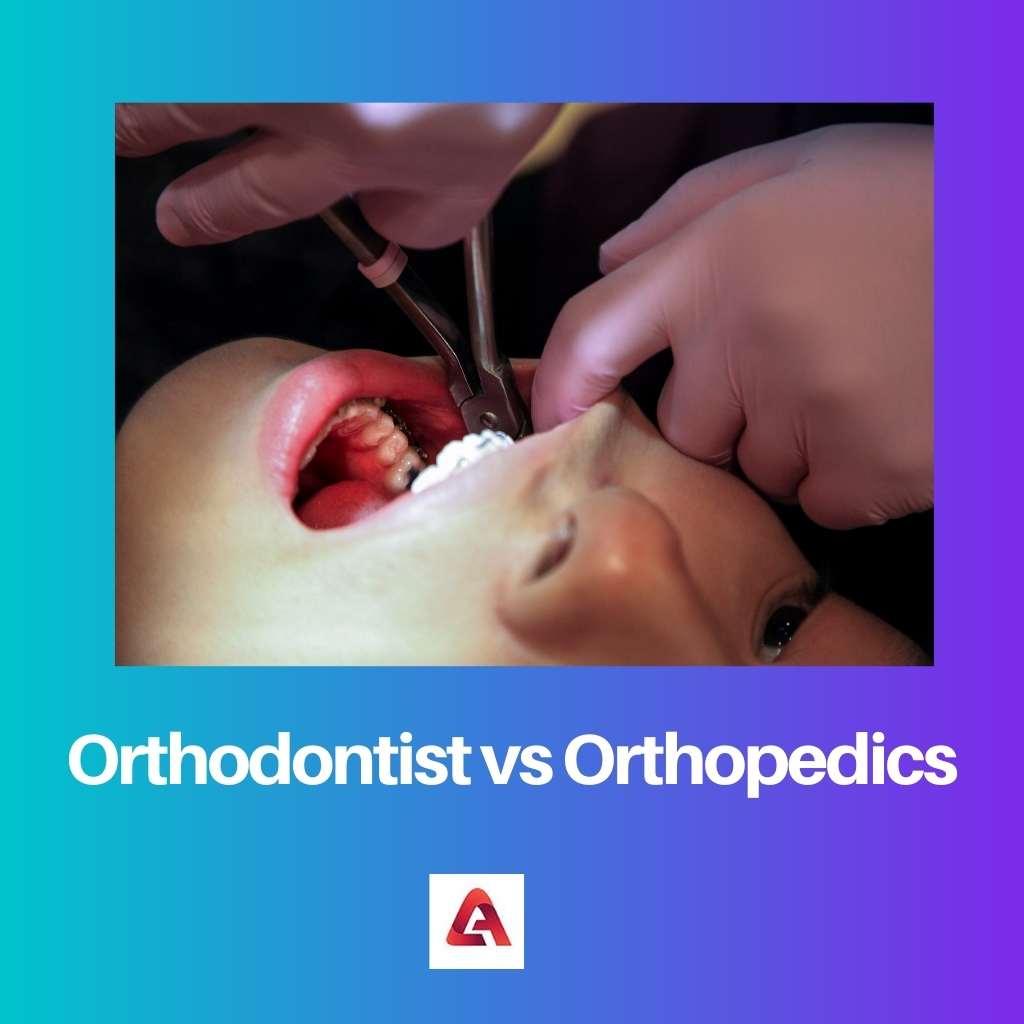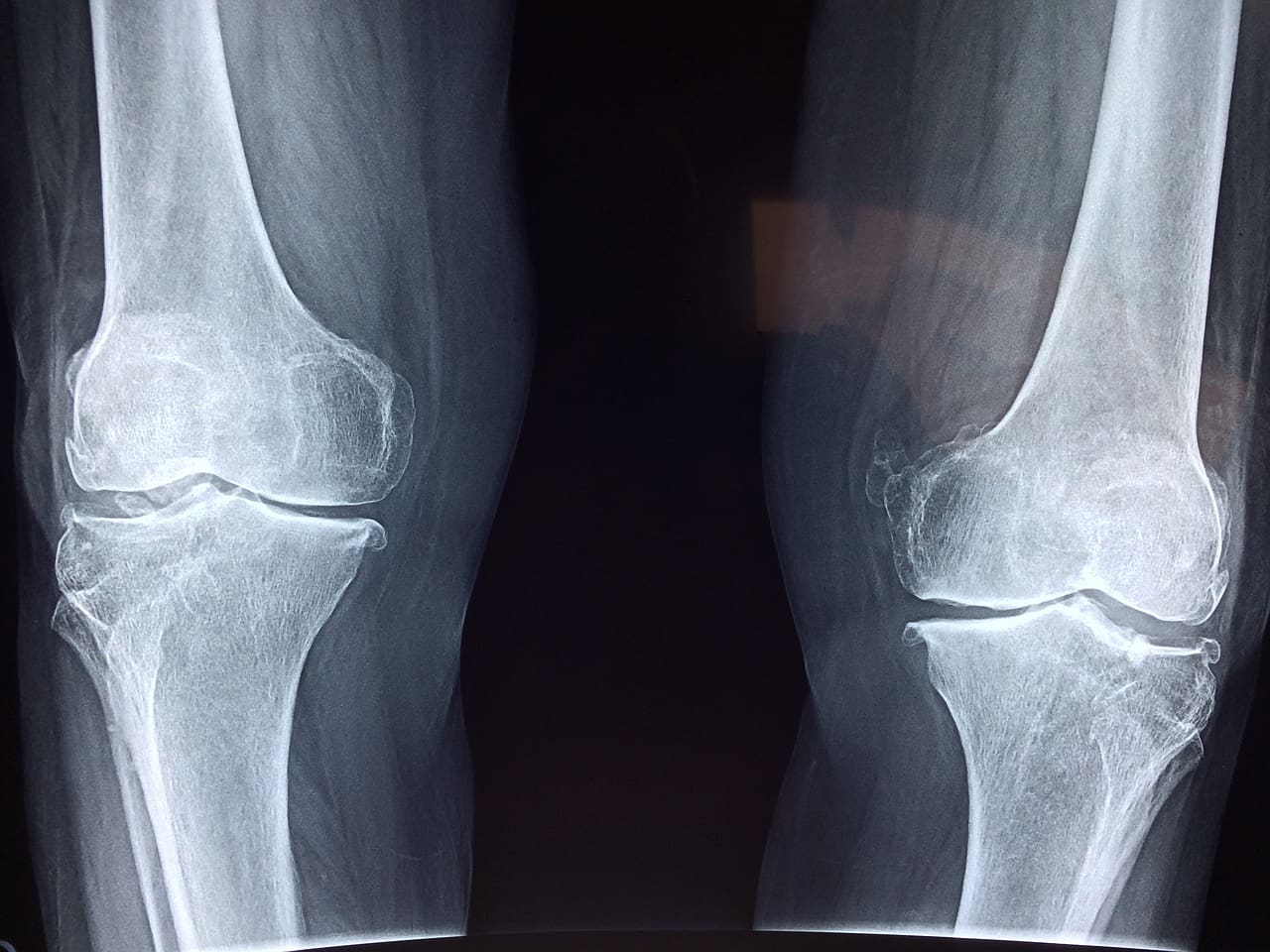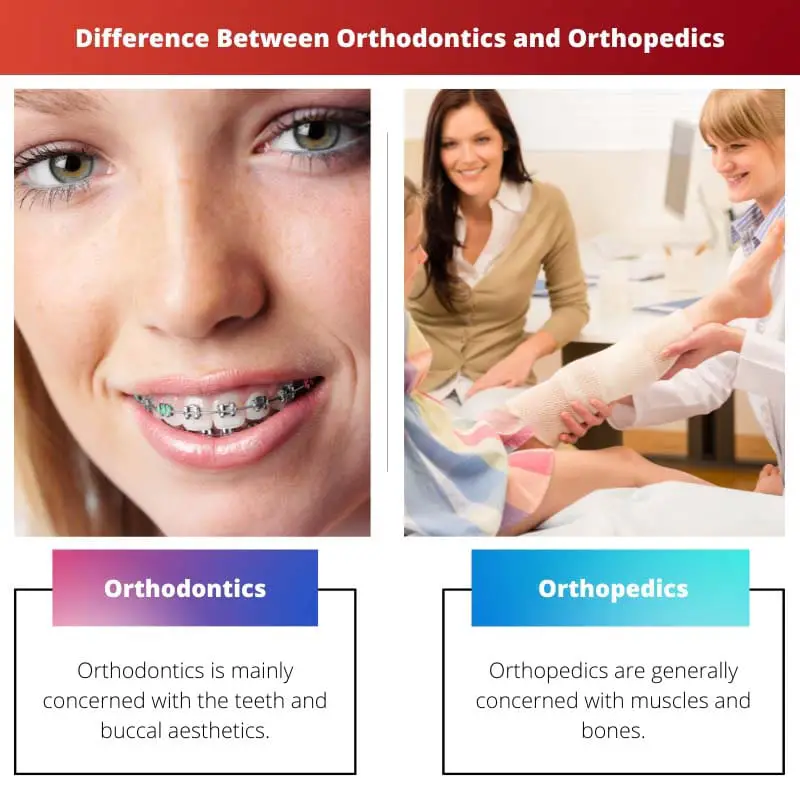Orthodontics and Orthopedics are two very similar terms that are confused with being the same thing. However, they are very different fields with different job responsibilities.
Both Orthodontics and Orthopedics are various facets of dentistry and medicine. However, they are completely different disciplines, and the terms should not be interchanged.
Key Takeaways
- Orthodontics focuses on correcting misaligned teeth and jaws, while orthopedics deals with the prevention and treatment of musculoskeletal disorders.
- Orthodontists specialize in treatments like braces, while orthopedic surgeons perform procedures such as joint replacements.
- Both fields require extensive training and education, but orthopedic surgery is more invasive than orthodontic treatment.
Orthodontist vs Orthopedics
Orthodontics is a specialized field of dentistry that emphasizes the diagnosis, prevention, and correction of mispositioned teeth and jaws. Orthopaedics is a medical specialty that focuses on the treatment of musculoskeletal conditions affecting bones, joints, muscles, tendons, and ligaments.

Orthodontics is the dental specialty concerned with the evaluation, diagnosis, prevention, and treatment of malocclusions, facial and dental arch irregularities, and related oral problems.
Orthodontic treatment consists of four components: prevention, evaluation, diagnosis, and treatment. Medical professionals dealing with orthodontics are called orthodontists.
Orthopedics is the medical practice that deals with the study and application of medical, surgical, and other therapeutic treatment of a disorder, injury, or trauma of the musculoskeletal system.
Orthopedics also focuses on the general health and wellness of the patient and helps patients with spinal and musculoskeletal issues.
Comparison Table
| Parameters of Comparison | Orthodontics | Orthopedics |
|---|---|---|
| Concerned With | Orthodontics is mainly concerned with the teeth and buccal aesthetics. | Orthopedics are concerned with muscles and bones. |
| Health Professional | A health professional practicing orthodontics is called an orthodontist. | A health professional practicing orthodontics is called an orthopedist. |
| Medical Field | Orthodontics is part of the dentistry field. | Orthopedics is a part of the medical field. |
| Qualification | To be an Orthodontist a person has to complete a dental degree like DDS or DMS | To be an Orthopedist a person has to complete an MBBS degree. |
| Surgery | An orthodontist doesn’t have a license to perform dental surgeries. | An orthopedist is licensed to perform surgeries as well. |
What is Orthodontics?
Orthodontic treatment is used to correct problems with your teeth. This may include problems with a person’s jaw position, crowded teeth, or teeth that are misaligned.
It can also be used to fix problems like overbites, underbites, and gaps between teeth. Orthodontic treatment is done by a person who is specially trained in how to straighten and align teeth.
This treatment can be used for children, teens, and adults. Orthodontics is the branch of dentistry that is concerned with the prevention, diagnosis, and treatment of malocclusions and malposition of teeth and jaws.
All four components are essential to the overall treatment and correction of malocclusions and other dental irregularities.
The field is distinguished from periodontics, which primarily involves the maintenance of the soft structure that supports the teeth.
Orthodontics is fundamentally different from most other dentistry because the dental health professionals who work in the field will have completed a four-year university degree.
Orthodontists are primarily responsible for correcting issues with teeth and gums. Since this is a medical field, you’ll have to have a license to do this job, which involves at least four years of school and passing written and clinical exams.

What is Orthopedics?
Orthopedic medicine is a field of healthcare that is concerned with the diagnosis, management, and prevention of musculoskeletal injuries, disorders, and diseases.
Orthopedic surgeons are trained to provide surgical care and to help restore maximum mobility and quality of life to people who have been affected by trauma, arthritis, or congenital conditions.
The word orthopedic means “correcting deformity,” so orthopedists focus on disorders like scoliosis, congenital hip dysplasia, knee arthritis, and fractures, as well as trauma like fractures, dislocations, and ligament sprains.
Orthopedics is the branch of medicine that deals with disorders of the musculoskeletal system, particularly the spine and the limbs.
An orthopedist is a physician specializing in treating disorders of the musculoskeletal system, such as the spine and the limbs.
Orthopedics is a subspecialty of general surgery or orthopedic surgery, which is itself a subspecialty of general surgery. Orthopedic surgeons are also known as orthopedists.
Orthopedic surgeons are experts in the diagnosis, treatment, and prevention of musculoskeletal conditions. They are well trained in the latest techniques of injury, disease, and deformity treatments, as well as in the use of prosthetics and orthotic devices.

Main Differences Between Orthodontics and Orthopedics
- Orthodontics is more commonly done by an orthodontist, while Orthopedics is performed by a surgeon.
- Orthodontics is the area of study that deals with the mouth, specifically the teeth. Orthopedics is the area of study that deals with the arms and legs and the muscles and bones that comprise them.
- Orthodontic devices are prescribed to treat dental malocclusions and improve esthetics, while orthopedic devices are used to ease pain and discomfort related to the muscle or bones. It’s not concerned with aesthetics primarily.
- Orthodontists are not concerned with any pain in the muscles or bones, while orthopedists specialize in that.
- An Orthodontist knows how to fix braces and retainers while orthopedics is not specialized in it.

References
- https://books.google.com/books?hl=en&lr=&id=N0SwDAAAQBAJ&oi=fnd&pg=PP1&dq=orthodontics&ots=uWPb3qd2Rh&sig=3EcYh_xyz7RCHZGvWwlqJ-FGHnw
- https://www.biolifesas.org/biolife/2020/03/31/how-to-reduce-the-likelihood-of-coronavirus-19-cov-19-or-sars-cov-2-infection-and-lung-inflammation-mediated-by-il-1/
- https://www.jco-online.com/media/18274/jco_2003-04-217.pdf



